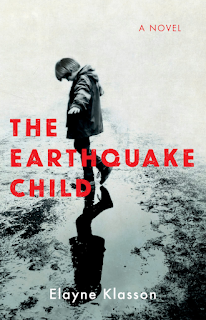Elayne Klasson is the author of the new novel The Earthquake Child. She also has written the novel Love Is a Rebellious Bird. A psychologist, she has worked at San Jose State University. She lives near Santa Barbara, California.
Q: What inspired you to write The Earthquake Child, and how did you create your characters Joshua and Eleanor?
A: I was inspired to write The Earthquake Child because I am the mother of both adopted and biologic children. Although each of our children are unique individuals, I was particularly interested in what factors affect children who have been adopted.
Looking at nature versus nurture, as well as the very fact of adoption, how is an adopted child’s personality and core molded? I knew there are not hard and fast answers, yet I wanted to explore these issues using the story of one child’s adoption.
Eleanor, the adoptive mother, is an amalgamation of me and my experience with adoption, as well as the many adoptive parents I met in support groups for parents of adopted kids—particularly adopted kids who are troubled and exhibit behavioral and emotional problems.
The character of Joshua was similarly created from my own adopted child’s experience as well as the many kids I met through adoption support groups, residential therapy schools and support groups for parents of troubled kids—most specifically Al-Anon.
Q: How would you describe the dynamic between them?
A: The dynamic between mother and child changes as the child matures. When Joshua is young, there are few problems. Eleanor is a devoted mother and often expresses her gratitude at having another chance, late in life, to mother. She and Joshua are extremely close and bonded.
However, because of the stresses she experiences due to her husband’s illness, she feels guilty at not having the perfect family that she imagined she was supposed to give Joshua.
Eventually, as the boy enters adolescence, there is great struggle with him as he tries to individuate from his mother and the rest of the family. Of course, the dynamic of adolescents struggling to separate, is one we see in most teenagers.
However, the book examines how Eleanor increasingly worries. She doubts herself and wonders whether and when she should act to protect Joshua. Like all parents, she struggles with the high-risk behaviors she sees in her son.
What is normal behavior? When should she intervene? Is she denying the seriousness of Joshua’s behavior? Her experience raising her older, biologic children have not prepared her for the extreme behaviors she sees in Joshua.
Q: How was the novel’s title chosen, and what does it signify for you?
A: Early in the novel, we are witness to the 1989 Loma Prieta Earthquake in Northern California. The shaking of the earth results in Eleanor realizing her own desire to have a child with her second husband.
Often natural disasters, and other near-death experiences, are sometimes important in helping people come to terms with their deep-seated desires and dreams. Eleanor’s dream to expand her family was triggered by her experience in the earthquake.
This natural phenomenon of an earthquake is also representative of the cataclysmic effect which Joshua’s behavior has on his family. The unpredictable nature of his acting-out behaviors mirror the unpredictability of an earthquake. We don’t know how long this seismic shaking will go on and we don’t know what permanent or lasting harm it will cause.
Q: The writer Susan Straight said of the book, “The Earthquake Child is a clear-eyed look at the most complicated of family lives, bound tightly by loyalty and ineradicable love.” What do you think of that description?
A: Thank you to the wonderful writer Susan Straight, who also understands dramatic events in families. She has written of her own family’s complicated struggles with divorce, racial inequality, and acting-out behaviors.
I like her comment about my book and know that no matter what behaviors are described in The Earthquake Child, there are strong bonds of love between siblings and parents which are unbreakable. People never give up on each other. Joshua and Eleanor never give up on each other.
An adoption leaves its own kind of scar tissue (as quoted from A.M. Homes in the epigraph), and yet the adopted child and adoptive parent never cease loving one another.
Q: What are you working on now?
A: I have said that because my publishing career started when I was old—in my 70s—I have no time to waste. Because of my consciousness of time passing quickly in these years, I write books about subjects I care passionately about.
So, my first published novel, Love is a Rebellious Bird, was about why we love the people we do. It follows a 60-year romance between two individuals who never marry, but pass into and out of each other’s lives.
This second book, The Earthquake Child, is about the interplay of nature and nurture in children—specifically in adopted children. It is, obviously, a subject I care deeply about.
I have begun work on a new novel, with the subject being female friendships. I am writing about a group of five friends who have a very long history together. I want to look at the bonds and struggles between women which result in long-lasting and nurturing friendships.
In my own life, these powerful, deep, and long-lasting friendships have sustained me more than any other relationships. I never minimize my friendships and am eternally grateful for them.
However, I want to further examine friendship through the lens of fiction and not in a superficial greeting-card manner. I look forward to the quieter days ahead to work on this novel.
--Interview with Deborah Kalb. Here's a previous Q&A with Elayne Klasson.


No comments:
Post a Comment